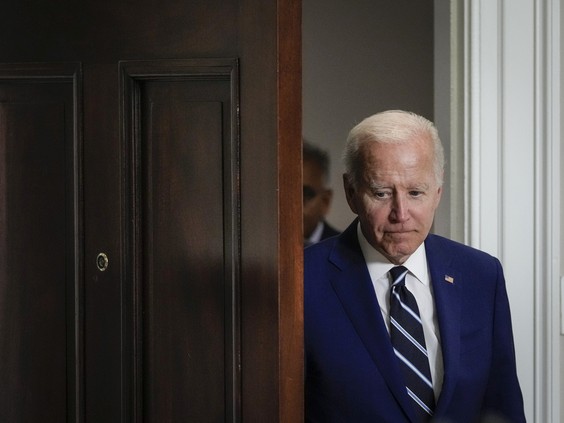Biden Is Laying the Groundwork for a Palestinian Capital in Jerusalem
(Israel) on 15 June 2022
by Yoni Ben Menachem (link to original)
President Joe Biden will visit Israel and the Palestinian Authority on July 13-14, according to the White House. On Tuesday, senior Palestine Liberation Organization official and Mahmoud Abbas confidant Hussein al-Sheikh met for the third consecutive time with Assistant Secretary of State for Near Eastern Affairs Barbara Leaf, who came to Israel to prepare for Biden’s visit.
The president will visit Bethlehem, where he will be hosted by the chairman of the Palestinian Authority, who previously hosted former President Donald Trump. Biden will also make a first visit to visit to Al-Makassed Hospital in East Jerusalem, where he is expected to announce the restoration of tens of millions of dollars in financial aid to the health care system in East Jerusalem.
The Biden administration is very concerned about the health of Abu-Mazen* and fears that his fall from the political stage will destabilize the Palestinian Authority and the West Bank, bringing with it a bloody battle over his successor and strengthening the position of Hamas. Biden is also concerned that prior to his planned visit to Israel, Abu-Mazen will take steps that complicate the political situation, while the Naftali Bennett-Yair Lapid government falters and is about to collapse.
In a conversation with Secretary of State Antony Blinken and French President Emmanuel Macron last week, Abu-Mazen warned that the Palestinian leadership is seriously reconsidering a decision by the PLO Central Committee to suspend recognition of Israel together with security coordination in light of “Israeli escalation in Jerusalem and the Temple Mount,” as demonstrated “by the events of Jerusalem Day.”
Biden quickly dispatched Deputy Assistant Secretary for Israeli and Palestinian Affairs Hady Amr to Ramallah, as well as Leaf, who met with Abu-Mazen. Leaf emphasized the Biden administration's commitment to a two-state solution. However, Abu-Mazen again threatened to suspend relations with Israel and demanded that the administration stand by its commitment to open an American consulate in Jerusalem and PLO offices in Washington, and remove the PLO from the state terrorism list.
The Biden administration announced bureaucratic changes last week at the American Embassy in Jerusalem to send a message of calm to the Palestinian Authority chairman and to indicate the president is not withdrawing from his commitments to open the consulate, something that in fact signals American recognition of East Jerusalem as the capital of a future Palestinian state and in effect nullifies Trump’s recognition of Jerusalem as the capital of Israel.
The administration again decided to separate the department dealing with Palestinian affairs from the U.S. Embassy in Jerusalem; the office of Palestinian affairs will report directly to the State Department in Washington instead of Ambassador Tom Nides. The official name was changed from “the Palestinian Affairs Unit” to “the Office of Palestinian Affairs,” and it will continue to be headed by Assistant Deputy Chief of Mission George Noll. The Biden administration has updated Israel on these moves, and Israel did not object, despite the fact this is clearly an intermediate phase in opening of an American consulate in Jerusalem to deal with Palestine.
The Trump administration closed the American Consulate in Jerusalem in 2018 and, accordingly, reducing the amount of U.S. representation with respect to the Palestinian Authority while simultaneously moving the American Embassy from Tel Aviv to Jerusalem. The work at the consulate was combined with work at the embassy to eliminate any indication that the U.S. recognized Palestinian sovereignty. The American ambassador in Jerusalem previously reported directly to the administration on events in the Palestinian arena. Now, Noll will report directly to Washington, and will receive instructions directly from the Middle East affairs section at the State Department in Washington without any involvement by the ambassador.
This is a temporary American move to ease the situation given Palestinian pressure and threats by Abu-Mazen. American officials say the move will expedite political messaging between the Biden administration and the Palestinian Authority and strengthen relations between them. The president is trying to hold onto a stick from both ends. On the one hand, he seeks to ease concerns by Abu-Mazen and take another step forward toward reopening the consulate. On the other hand, Biden is trying to avoid a political confrontation with the Bennett-Lapid government and thus provide ammunition to the right-wing parties in Israel.
Until Biden arrives in the region next month, if he makes the visit at all, the two American representatives who visited Ramallah are sending the message that the United States is committed to a two-state solution and to opening the consulate in Jerusalem. In the meantime, the Americans claim this is enough to appease Abu-Mazen.
Israel made a mistake by not objecting to the Biden administration’s interim move. Biden is adamant that he will not compromise on opening the consulate, and Israel must act consistently with respect to the important matter of preserving the historic declaration by Trump. In fact, Biden’s approach is the beginning of the end of what Trump declared.
*Editor’s Note: Mahmoud Abbas is also known as Abu-Mazen.

